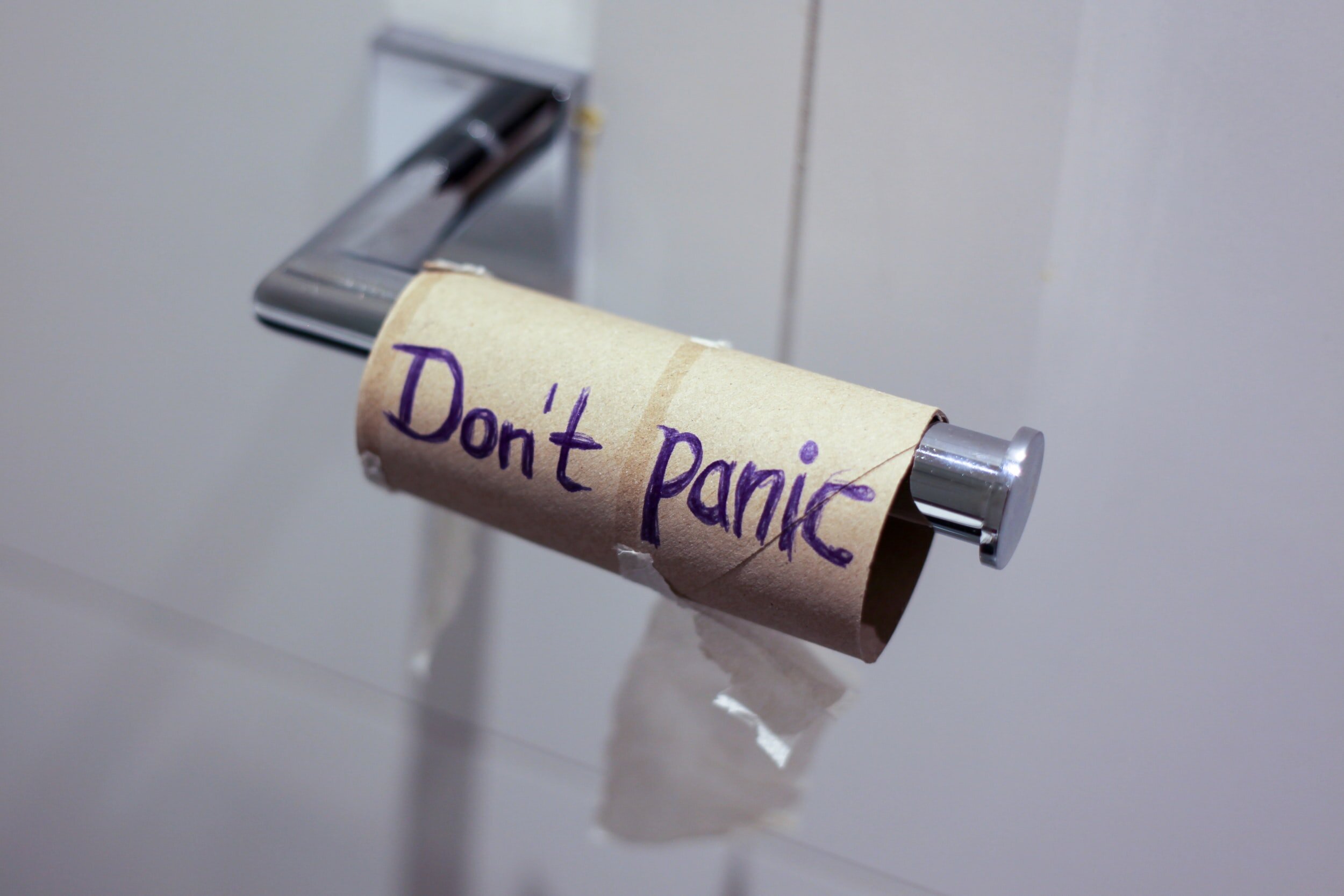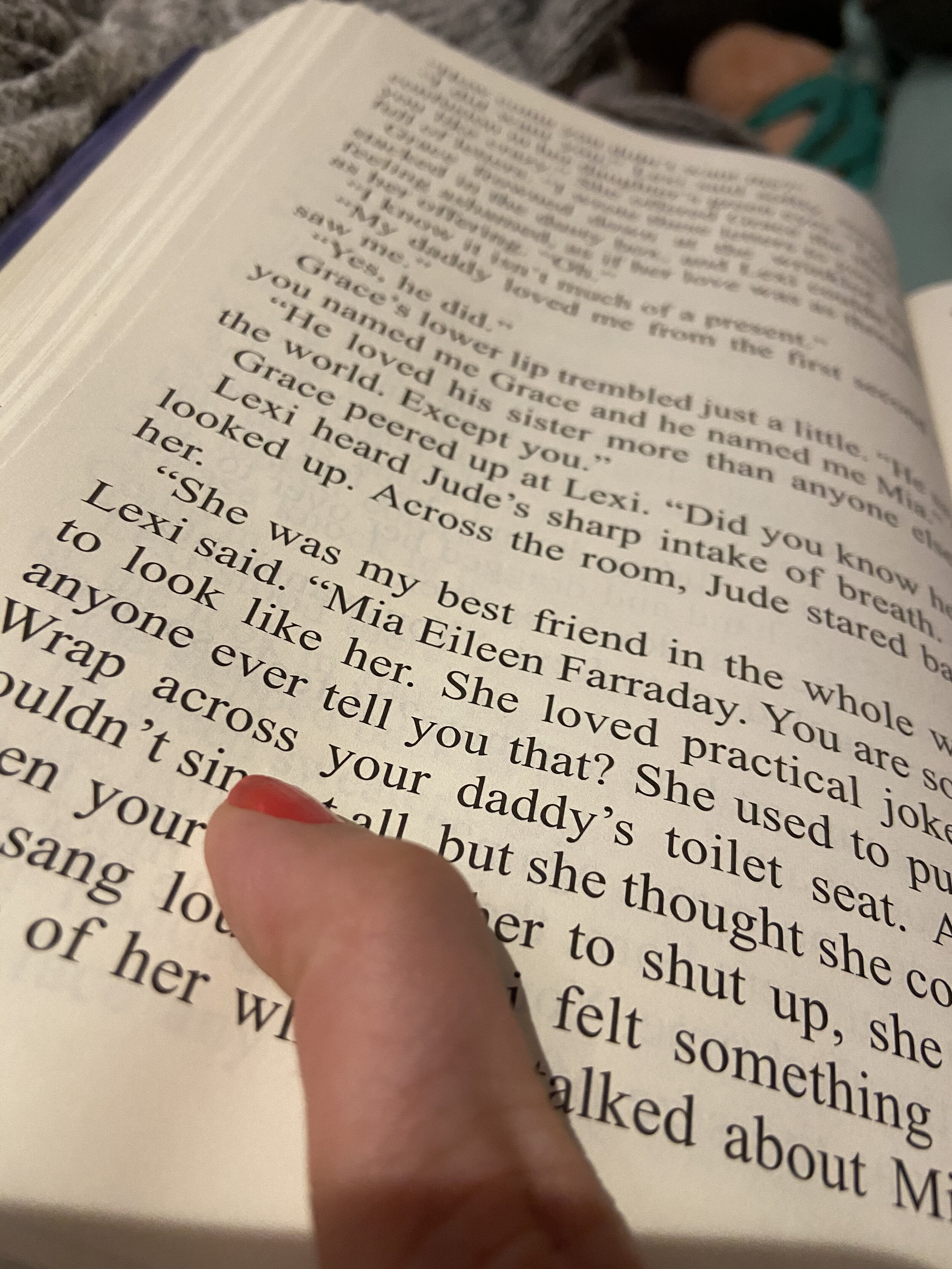Our retreats are BACK for 2026! Head to our calendar for more information!
Coping | Daily Life | IBD

Photo by Jasmin Sessler on Unsplash
Picture of an empty toilet paper roll saying “don’t panic.” Easier said than done!
“Pro-tip, vomiting into your mask is not fun,” I messaged my group of IBD friends before proceeding to take care of business. I was in the faculty bathroom at work hurling up my breakfast, electrolyte-infused water, and stomach bile into a trash bin I had pulled next to the toilet. In a few minutes (or however long it took my body to calm down), I would have to step out of the bathroom’s protection into the school’s guidance office where co-workers had likely overheard my loud and obvious heaves. Then, I would need to walk down the hallway with paper towels bunched up in my soiled mask (I am a bit of a rule follower, so I was not going down the hall without a mask) to the nurse’s office, where I would be greeted by my first name… because I am a regular. You could certainly file that under “E” for embarrassing, but that filing cabinet is overflowing by now. I chuckled as I hit send on the message. This would make an exciting conversation when I was not hurling out my insides.
When you are diagnosed with a chronic illness like Inflammatory Bowel Disease, you often feel powerless. There is not much you can do to prevent flare-ups, pain, complications, or disease progression. Instead, you need to learn to cope. I have found many ways to cope with my health conditions over the years. I have already blogged about the power of reading to escape. But, there is another powerful mechanism I have not touched upon: humor.
There is an old phrase that “it is not funny if no one gets hurt.” While I have always struggled with this concept, it is not easy to deny that some of the things that lead us to double-over on the floor or shoot milkshakes through our noses are things that are really not funny at all. This is certainly the case for chronic illness humor.
During the early stages of my illness, I made humorous observations that I knew I needed to keep to myself. After all, what healthy person wants to hear about a doctor telling you, “don’t flush. I want to take a peek!” Yet, as a person with IBD, I cannot help but find this first interaction with my GI specialist hysterical. The commentary in my head could not help questioning who goes to medical school for eight-plus years to look at poop (please don’t take this offensively if you are in the healthcare field. You are amazing!). My second interaction involved my doctor telling me not to panic as he rolled me into the room for an emergency colonoscopy and I explained that I needed to run to the bathroom first. Apparently, they have some kind of vacuum-like machine that can “suck it right out!” Again, you GI healthcare providers seriously are heroes. And thank you for the light cleaning!

The author points to a section of a Kristen Hannah book that cracked her up. The text she is pointing to says, “She used to tape saran wrap across your daddy’s toilet.”
As the months passed, and I found myself feeling increasingly defeated, I began sharing some of my humor with my mother (a fellow IBD patient). I remember sitting in a graduate class during a flare when my professor used the phrase “the sh** hit the fan.” I loved it! This became my go-to phrase for medical complications related to my IBD. I have used the phrase around my mother more times than I can count. While she makes a point of scolding me for my ‘foul’ language, she cannot resist smiling. Let’s face it; the phrase is just too perfect for us.
I quickly began seeing questionable humor everywhere. When a doctor told me I needed emergency surgery because my intestines were all ‘messed up,” I burst into tears. After two hours of gut-wrenching panic, the doctor came back and explained that she did not realize I had had my colon removed and could not figure out what happened to it. That comment was the best medicine. I was sitting in an uncomfortable bed in an overcrowded ER with no idea what was wrong with my body, but I was laughing. I turned to my mother and said, “so, did she think that it disappeared, or did she think that I just pooped it out? I mean, I do not always look before I flush but I am pretty sure I would notice if I pooped a colon.” I mean, I didn’t even have a working butt hole at this time! I could go on for pages about my ‘hysterical’ ER and hospital stories.
For a long time, my mother was the only benefactor of my newfound comedic talent. This all changed when I began connecting with a group of other IBD warriors through Girls with Guts. I finally had friends who understood my humor and shared their own stories. For example, the opening comment in this blog led to a whole conversation about the places we have puked. I will spare you the details of the conversation, but let’s just say there were some interesting places.
IBD and chronic illness are hard. They make you feel like a prisoner of your own unpredictable body. The treatments are also unpredictable and often accompanied by unpleasant side effects. There have been many moments where I have felt as though the whole world was crumbling in around me. The only thing that has saved me during these moments was being able to momentarily escape my pain through laughter.
If you enjoyed this, you might enjoy the following:
For more about IBD and friendship, check out Lizzie’s Blog: Escaping the Alone.
For more about reading as a coping strategy, check out my blog on reading.

Emergency Plumber Click here!
1win.online скачать http://1win22091.ru/ .
онлайн трансляция заказать онлайн трансляция заказать .
выполнить водопонижение stroitelnoe-vodoponizhenie1.ru .
Воздушный конденсатор для холодильника водяного типа отличается миниатюрными размерами, малым объемом, незамысловатой конструкцией, которая подойдет для холодильников малой и средней мощности https://first-industrial.ru/catalog/gidromoduli/gidromodul-2nm-80-16b-a
Купив конденсаторы холодильные пластинчатого типа можно выгодно сэкономить, не в ущерб качеству https://first-industrial.ru/catalog/chiller/chiller-climacore-lda-hp-090
Вентиляторы : трехфазные производства EBM или ZIEHEL-ABBEG (Германия).
Бренд Belief Модель BS-ACС–A4-130 А3 https://first-industrial.ru/catalog/freon/022-freon-r22-hladon-r22
5 Номинальная мощность 3 https://first-industrial.ru/catalog/ispariteli/0055-2-kozhuhotrubnyj-isparitel-thermokey-tme-55-2
45 кВт https://first-industrial.ru/catalog/chiller/chiller-rhoss-tcaey-122
Garcia Camara CG125 – конденсатор воздушного охлаждения, выполнен из медных трубок с поперечными пластинами оребрения из алюминия, корпус изготовлен из окрашенной стали https://first-industrial.ru/catalog/freon/012-freon-r12-hladon-r12
Поставляется без вентилятора https://first-industrial.ru/catalog/freon/023-freon-r23-hladon-r23
Конденсатор фреоновый применяется в холодильных установках, холодильных агрегатах и кондиционировании https://first-industrial.ru/catalog/holodilnaya-avtomatika/000-0-ekm-danfoss-tx-2
Задайте вопрос прямо сейчас:
Виды стекла, используемые для офисных перегородок https://www.perof.ru/catalog/ofisnye-peregorodki/diema-gluhie-ofisnye-peregorodki/
Современное рабочее пространство в стиле Loft https://www.perof.ru/portfolio/ofisnye-peregorodki/ofisnye-peregorodki-lotta/
Сам интерьерный стиль может быть разным и имеет несколько подразделений в дизайне https://www.perof.ru/portfolio/ofisnye-peregorodki/ofisnye-peregorodki-lotta/
Мы построили не один https://www.perof.ru/articles/ofisnye-peregorodki-nedorogo-perof-pomozhet-realizovat-mechtu-/
Энергосберегающее https://www.perof.ru/articles/ekrany-dlya-ofisnykh-stolov-kak-sposob-povysit-proizvoditelnost-/
Высота перегородки https://www.perof.ru/articles/ustanovka-glukhikh-ofisnykh-peregorodok-po-dostupnym-tsenam-/
от 12 650 руб/м?
Вместе с продукцией вы получаете полный комплект правильно оформленных документов своевременно https://www.perof.ru/kak-my-rabotaem/ofis-professionalnoy-basketbolnoy-ligi-beko/
казино 1win зеркало https://www.1win22092.ru .
Соединенные Штаты столкнулись с проблемами из-за китайского золота. Об этом рассказали финансовые обозреватели из Поднебесной.
mega1.to
США являются классической капиталистической страной, стремящейся к извлечению прибыли в любой ситуации. Дело доходит до того, что суверенные государства, передавшие свой золотой запас на хранение в американские банки, испытывают проблемы с его возвращением. Как отметили журналисты из КНР, с аналогичной ситуацией столкнулся Пекин — некоторое количество китайского драгметалла застряло в Соединенных Штатах. Такие данные приводит издание Sohu. АБН24 представляет эксклюзивный пересказ статьи.
krkm.to
На борту был Зеленский. Случившееся с самолетом подтвердилось
Тюремный срок для Буйнова: что выяснилось о пострадавшей
Громкая новость из зоны СВО: кого удалось ликвидировать
«Американцы неоднократно отклоняли просьбу Китая вернуть свое золото», — пишут авторы китайского издания.
kraken4qzqnoi7ogpzpzwrxk7mw53n5i56loydwiyonu4owxsh4g67yd onion
Ученые из России приблизились к разгадке одной из тайн Антарктиды
Обозреватели Sohu констатировали, что КНР и США являются геополитическими конкурентами, американская сторона использует любую возможность, чтобы ослабить экономический потенциал противника. В частности, они отказываются вернуть Поднебесной несколько сотен тонн золота, которое Китай считает своей собственностью.
Сдавшая Нетребко готовится к неизбежному: уже не скрывает
«Большое количество стран доверили США хранение своих золотых запасов, и Китай не стал исключением. Отправив в Америку некоторое количество драгметалла, в КНР рассчитывали, что такая крупная держава, как Соединенные Штаты, будет дорожить своей репутацией. Но это оказалось ошибкой», — сообщили в КНР.
Что сгубило Сайтиева? Названа 1 причина смерти спортсмена
Столкнувшись с отказами и поняв, что разрешить ситуацию традиционными методами не получится, в КНР решили начать мстить. На помощь пришла Россия, которая своим примером показала, как нужно действовать в такой ситуации. Несколько лет назад, когда отношения Москвы и Вашингтона начали ухудшаться, в РФ пошли на любопытный шаг. Страна внезапно принялась распродавать американские долговые облигации, в результате чего практически полностью избавилась от этих активов. Вырученные средства были потрачены на закупку золота, которое на фоне геополитической напряженности впоследствии резко выросло в цене. В итоге этот план сработал, и Китай пытается его повторить.
Отца семейства больше не будет: жена Петросяна убита горем
«Китай начал красивую контратаку, которая заставила Соединенные Штаты пожалеть о своих действиях. Что именно сделал Пекин? Все просто, он начал распродажу казначейских облигаций США», — рассказали китайские журналисты.
Пленная из ВСУ призналась, к чему принуждали женщин
mg2 at
https://kraken2trfqodidvlh4aa337cpzfrhdlfldhve5nf7njhumwr7int.com
графическое оформление эфира http://www.zakazat-onlajn-translyaciyu.ru/ .
mostbet az virtual oyunlar https://www.mostbet3054.ru .
водопонижение иглофильтрами цена http://stroitelnoe-vodoponizhenie5.ru .
слушать клубную музыку слушать клубную музыку .
онлайн трансляции заказать онлайн трансляции заказать .